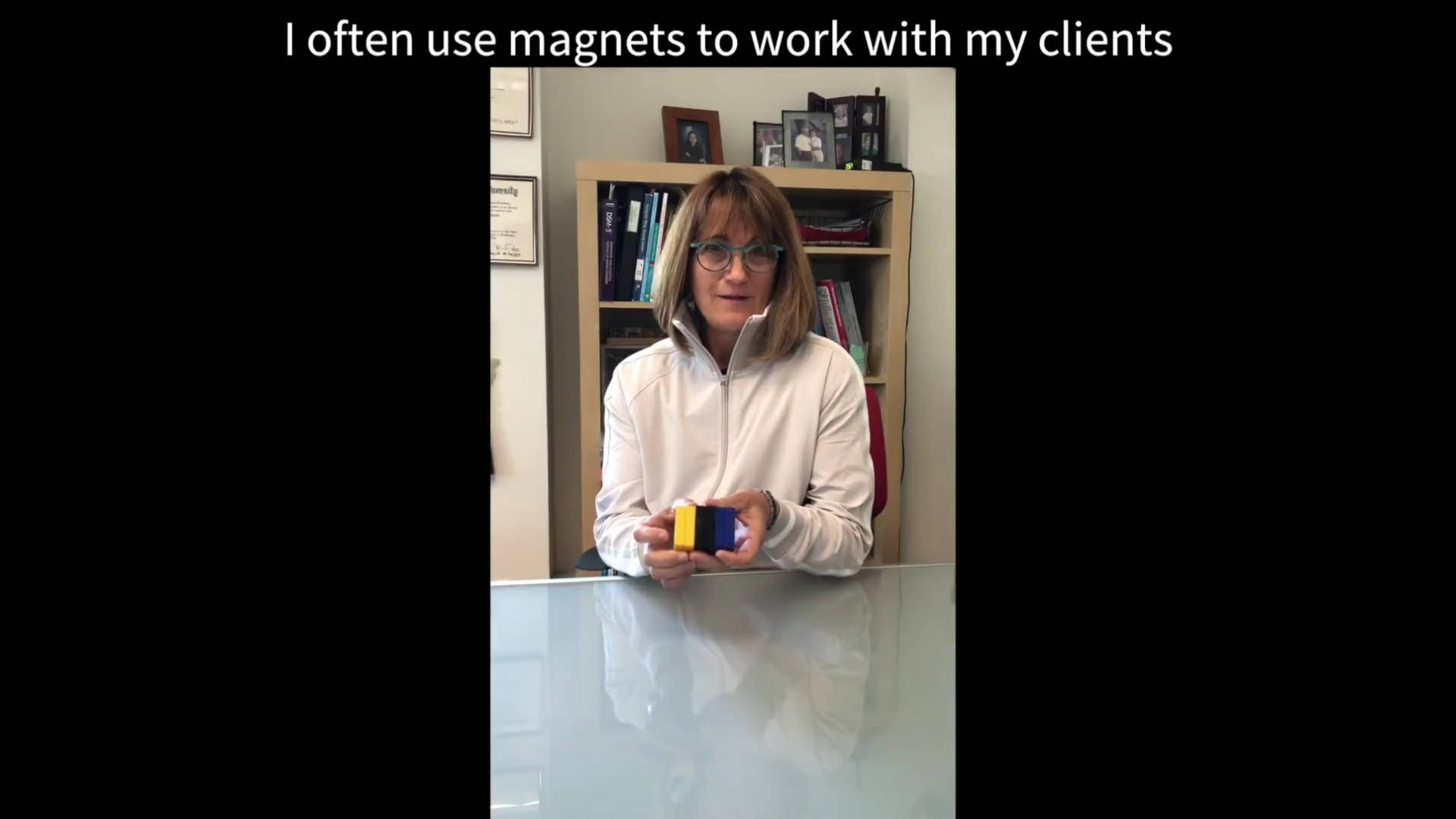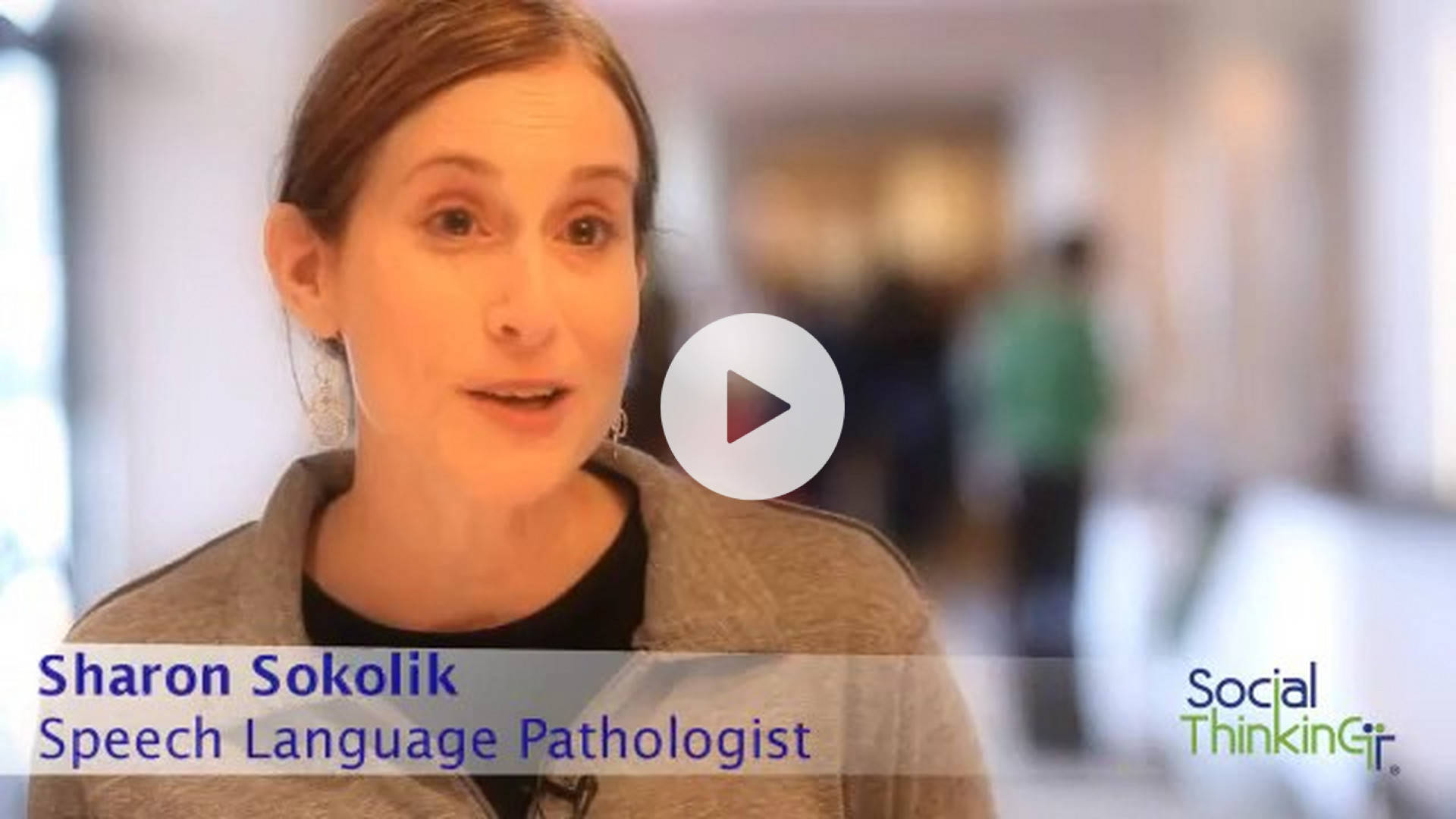
Watching a clinical case study, or “case journey,” unfold overtime can be very informative and powerful—and gaining tools to unpack the case journeys of the individuals you support is even better. In this course, we explore several clinical case journeys and apply a unique six-step decision-making template as a guide through the treatment process. We also help you organize your treatment planning according to our two new foundational categories: how the social world works and how I work (navigate to regulate) in the social world.
Watch this short video example Michelle Garcia Winner shares in the adolescent track of this course—demonstrating how she uses magnets with her clients to help explain friendships & relationships. You can use this exercise with pre-teen, teenagers, young adults, or even adults.
Learn a variety of concepts, frameworks, and strategies to build social competencies that align with an individual’s age, personality, social learning strengths/challenges, developmental abilities, and mental health challenges. In the afternoon, we will divide into groups based on student, client, or patient age and explore how different case journeys unfold. Members of the Social Thinking Training and Speakers’ Collaborative will share their own clinical case journeys and treatment ideas, and you will get the opportunity to practice using the six-step tool with your own cases. Get lots of hands-on participation and learning in this course!
- Description
- Who Should Attend
- What You Will Learn
- Schedule
- CE Credit
Treatment planning to foster the development of social competencies can be complicated as the social world is complex! In this course, we explore a unique six-step decision-making template to guide individualized treatment planning to foster social development across different types of social learners.
We will begin by explaining key conceptual frameworks from the Social Thinking Methodology as a way to help interventionists understand the social learning needs of a variety of learners. We will provide a problem-solving and planning template to teach about how the social world works prior to expecting individuals to work (navigate to regulate) in the social world.
Treatment sessions require the interventionist incorporate many different islands of knowledge to bring alive a treatment plan. In this course, we will explore how to bundle and layer treatment concepts, frameworks, and strategies from the Social Thinking Methodology. The combination of treatment tools will be anchored on a social learner’s age, personality, social learning strengths/challenges, developmental abilities, and mental health challenges.
Finally, we will review a planning and treatment journey to demonstrate the six-step process over time. Join us and practice using your own clients or students to organize your own decision-making to select practical tools to foster the development of social competencies. Enjoy lots of hands-on participation and learning in this course!
- Unpack and practice using the Six Steps for Treatment* Decision-Making template
- Organize your treatment planning according to our two new foundational categories: how the social world works and how to work (navigate to regulate) in the social world. These categories will help you identify which practical frameworks from the Social Thinking Methodology to use to support the needs of your varying social learners.
- Review the layers of evidence supporting the Social Thinking Methodology and connect the layers of evidence to the treatment planning process.
- Explore a conceptual framework, the Social Thinking–Social Competency Model (SCM), to guide treatment based on needs. We will demonstrate how the SCM intersects with the Social Thinking Social Learning Tree.
- Explore how treatment frameworks and strategies can be used in unison to develop different aspects of social-emotional learning.
- Discover how the same treatment frameworks and strategies can be used differently for individuals based on age and social learning development.
*Treatment refers to using conceptual and strategy-based frameworks to help individuals improve their social competencies.
Upcoming Conferences
We are currently not offering this course at an in-person conference, however we have over 20 online training courses taught by thought leaders in social competencies, self-regulation, executive functioning, and more.
Interventionists supporting ages 4 - young adult. At our conferences we share our latest frameworks, lessons, and strategies for teaching social thinking with a wide variety of interventionists, including: speech-language pathologists, special and general education teachers, social workers, counselors, clinical and school psychologists, occupational therapists, behavior specialists, and school administrators to name a few. It’s also used by family members and caregivers across settings.
Upcoming Conferences
We are currently not offering this course at an in-person conference, however we have over 20 online training courses taught by thought leaders in social competencies, self-regulation, executive functioning, and more.
- Use the six-step decision-making template to connect outside factors and informal assessment to treatment decisions and journeys.
- Use the Layers of Evidence visual to define conceptual frameworks from treatment frameworks.
- Describe why individualized treatment starts with learning how the social world works prior to learning to work (navigate to regulate) in the social world.
- Explain why social attention, the first step on the Social Competency Model, is critical for developing social competencies.
- Explain how the Friendship Pyramid and the Four Steps of Communication can be bundled in treatment.
Upcoming Conferences
We are currently not offering this course at an in-person conference, however we have over 20 online training courses taught by thought leaders in social competencies, self-regulation, executive functioning, and more.
This agenda may change without notice.
| 7:30-8:30 | Use social competencies to problem solve how to sign in, find a seat, and enjoy a cup of coffee or tea while getting to know fellow attendees |
| 8:30-10:15 | Explore the six-step decision-making template and review the Layers of Evidence supporting the Social Thinking Methodology. Discuss how treatment planning begins by exploring how the social world works prior to working (navigate to regulate) in the social world. |
| 10:15-10:30 | Break |
| 10:30-12:00 |
Explore how different treatment frameworks and strategies can be bundled or layered to address similar targets with social learners who present with different developmental abilities or across ages. |
| 12:00-12:50 | Lunch provided |
| 12:50-2:15 |
Deeper discussion and practice organizing and planning using the tools, concepts, strategies, and frameworks as a guide. Attendees will work in teams or individually to develop their own planning and decision-making templates based on their own clients or students. Dedicated audience Q and A time. |
| 2:15-2:25 | Break |
| 2:25-3:45 |
Real treatment journey example using the six-step decision-making template to show the process from organizing to planning to selecting practical treatment targets and tools from the Social Thinking Methodology. |
Upcoming Conferences
We are currently not offering this course at an in-person conference, however we have over 20 online training courses taught by thought leaders in social competencies, self-regulation, executive functioning, and more.
We are proud to be a continuing education provider for Speech-Language Pathologists, Social Workers, Marriage and Family Therapists, Clinical and School Psychologists, and Certified Counselors, such as Licensed Professional Counselors, Licensed Mental Health Counselors, Licensed Professional Clinical Counselors, and others.
We offer continuing education units/credits/clock hours through:
- ASHA: American Speech-Language-Hearing Association
- CES: Commonwealth Educational Seminars
- NBCC: National Board for Certified Counselors
- And more!
Upcoming Conferences
We are currently not offering this course at an in-person conference, however we have over 20 online training courses taught by thought leaders in social competencies, self-regulation, executive functioning, and more.









